Since my novel The Girl at Midnight came out in April, I’ve noticed one question—or one of its many permutations–popping up in quite a few interviews: How did you approach writing a strong female character? My answer tends to focus on Echo, the book’s primary point-of-view character (there are several). She’s only seventeen but she’s lived a hard life. It’s calcified her in some ways and softened her in others. I’ve got my routine answer down at this point, but every time that question rears its head, I get to thinking about the way in which we define strength in women, fictional and real.
For example, the character of Cinderella appears in conversations about feminine strengths and weaknesses. She’s often discussed as a passive figure in popular folklore—a girl who waits around for a prince to come and rescue her. But when I look at her tale, I see solid steel at her core. How many of us can say we’ve survived abuse and come out of it kind and compassionate and courageous? Cinderella has seen the darker side of family, and like Echo, she escapes to build her own life outside of the hostile environment that created her. But we still rarely see her, or characters like her, referred to as “strong” because their strength is of a quieter sort. For this list, I’ve decided to focus on fictional women of under-appreciated or otherwise unconventional strength.
Genya—Shadow and Bone by Leigh Bardugo
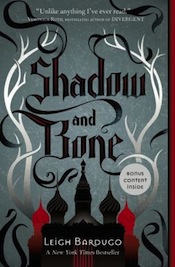 The protagonist of Bardugo’s Grisha trilogy, Alina Starkov, starts the series as an unlikely hero who comes into her own power. It’s a fascinating transition to behold, but what I find equally fascinating is Genya, the grisha she befriends upon her arrival in Os Alta. Genya is a Tailor, but not the kind who hems trousers and sews on buttons. Altering physical appearances in her specialty—she provides us with the Ravkan version of a makeover montage when she gets her hands on the plain Alina. On the surface, Genya would seem to be preoccupied with the superficial, but as the series progresses, you see that Genya has learned to weaponize her beauty. She is cunning, clever, and compassionate—all in all, not a Tailor to be trifled with.
The protagonist of Bardugo’s Grisha trilogy, Alina Starkov, starts the series as an unlikely hero who comes into her own power. It’s a fascinating transition to behold, but what I find equally fascinating is Genya, the grisha she befriends upon her arrival in Os Alta. Genya is a Tailor, but not the kind who hems trousers and sews on buttons. Altering physical appearances in her specialty—she provides us with the Ravkan version of a makeover montage when she gets her hands on the plain Alina. On the surface, Genya would seem to be preoccupied with the superficial, but as the series progresses, you see that Genya has learned to weaponize her beauty. She is cunning, clever, and compassionate—all in all, not a Tailor to be trifled with.
Sansa—A Song of Ice and Fire series by George R.R. Martin
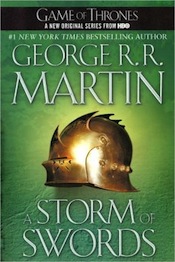 In A Storm of Swords, Sansa takes stock of her lot in life and finds that she’s changed from the lemon cake-loving girl she was when she came to King’s Landing, eager to marry the handsome Prince Joffrey (we all know how that turned out) and make her mark on the world as a future queen. Trapped in a lions’ den, Sansa discovers that she has little but her own internal strength to see her through the dangers of court. “My skin,” she says, “has turned to porcelain, to ivory, to steel.”
In A Storm of Swords, Sansa takes stock of her lot in life and finds that she’s changed from the lemon cake-loving girl she was when she came to King’s Landing, eager to marry the handsome Prince Joffrey (we all know how that turned out) and make her mark on the world as a future queen. Trapped in a lions’ den, Sansa discovers that she has little but her own internal strength to see her through the dangers of court. “My skin,” she says, “has turned to porcelain, to ivory, to steel.”
Clara—Winterspell by Claire Legrand
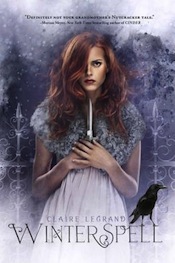 Winterspell‘s Clara is a complex character. Thanks to her godfather Drosselmeyer’s tutelage, she can kill a man with her bare hands, but she’s still haunted by an almost paralyzing fear. Clara comes of age in an alternate version of New York governed by a shadowy (and deadly) criminal cabal and is pursued relentlessly by the creepiest, scariest man imaginable—and he’s got the trail of dead bodies to prove it. Clara lives her life in a fog of fear and insecurity until she’s forced to find her strength to save the lives of the ones she loves—or die in the attempt.
Winterspell‘s Clara is a complex character. Thanks to her godfather Drosselmeyer’s tutelage, she can kill a man with her bare hands, but she’s still haunted by an almost paralyzing fear. Clara comes of age in an alternate version of New York governed by a shadowy (and deadly) criminal cabal and is pursued relentlessly by the creepiest, scariest man imaginable—and he’s got the trail of dead bodies to prove it. Clara lives her life in a fog of fear and insecurity until she’s forced to find her strength to save the lives of the ones she loves—or die in the attempt.
Roza—Bone Gap by Laura Ruby
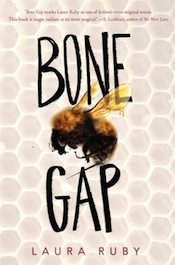 Laura Ruby’s Bone Gap is an ethereal dream of a novel. Ruby’s rich cast of characters is largely responsible for that, and one girl in particular was especially enthralling. Roza, the person whose disappearance serves as the novel’s catalyzing event, is a woman of almost unearthly beauty. And it’s because of that beauty that she’s underestimated and targeted. While some may look at Roza and see nothing but more than a pretty face, her beauty masks the iron at her core. She’s seen the darkest parts of men’s hearts and those experiences have molded her into something indestructible.
Laura Ruby’s Bone Gap is an ethereal dream of a novel. Ruby’s rich cast of characters is largely responsible for that, and one girl in particular was especially enthralling. Roza, the person whose disappearance serves as the novel’s catalyzing event, is a woman of almost unearthly beauty. And it’s because of that beauty that she’s underestimated and targeted. While some may look at Roza and see nothing but more than a pretty face, her beauty masks the iron at her core. She’s seen the darkest parts of men’s hearts and those experiences have molded her into something indestructible.
Simmea—The Just City by Jo Walton
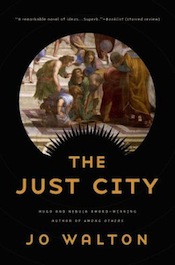 In The Just City, a group of idealists, brought together by the goddess Athena, run a experiment the likes of which the world has never seen: They create Plato’s Republic, exactly as he’d envisioned it. Well, they try. The Just City’s founders purchase slave children to raise in their utopia; one of the children, Simmea, is a girl born into unfortunate circumstances. Slavers raped her mother and killed her family as she watched. She experienced her own horrors on the slave ship en route to the Just City and these experiences mold her into the person she becomes: a woman who prizes justice, kindness, compassion, integrity, and intellectual curiosity above all things.
In The Just City, a group of idealists, brought together by the goddess Athena, run a experiment the likes of which the world has never seen: They create Plato’s Republic, exactly as he’d envisioned it. Well, they try. The Just City’s founders purchase slave children to raise in their utopia; one of the children, Simmea, is a girl born into unfortunate circumstances. Slavers raped her mother and killed her family as she watched. She experienced her own horrors on the slave ship en route to the Just City and these experiences mold her into the person she becomes: a woman who prizes justice, kindness, compassion, integrity, and intellectual curiosity above all things.
Melissa Grey was born and raised in New York City. She wrote her first short story at the age of twelve and hasn’t stopped writing since. After earning a degree in fine arts at Yale University, she traveled the world, then returned to New York City where she currently works as a freelance journalist. Her debut novel The Girl at Midnight is available now from Random House. Follow @meligrey on Twitter.










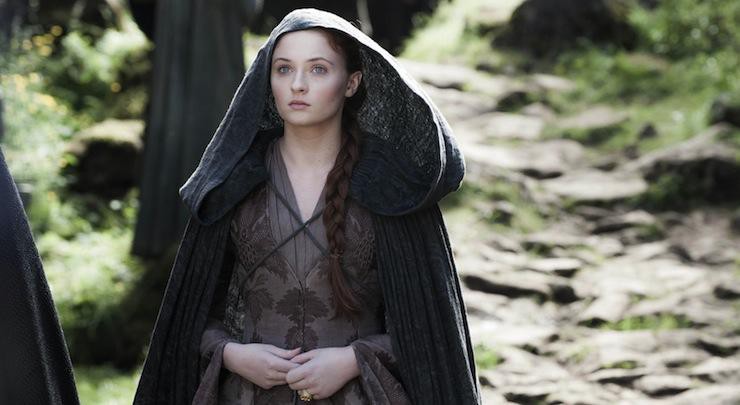
Sansa? Strength? Seriously?
Girl couldn’t fight her way out of a wet sack, nor think her way out of an open doorway. She’s a purely reactive character; everything that happens to her is done TO her, not BY her. Thats not strength, thats being there.
Some of these are odd choices to say the least. Sansa is pretty much the only Stark who was more interested in herself than anything else, and also the weakest. Even Bran, Rickon and Arya take control of their lives much more effectively than Sansa ever does in the books or show, and they’re several years her juniors.
Also, the Grisha Trilogy is many things but a fascinating look at an unlikely heroine’s journey towards coming into her own power is none of them. The world building in the books is actually pretty damn good, but Alina Starkov is a huge cliché of a protagonist. The “ugly” orphan girl who turns out to the be the chosen one and has every guy around her including the villain fall madly in love with her.
Sansa? Well, she’s still alive, and reasonably sane, isn’t she? That’s strength, of a rather useful kind, if you ask me.
To quote an undoubted “strong woman,” Cordelia Naismith Vorkosigan,
And while we’re on the subject, I know there are those who find Ekaterin a little bland and boring after the formidable Cordelia and the ass-kicking Elli Quinn. Tough, that’s their loss. Ekaterin growing into her own person is an eternal quiet delight. (And not always so quiet, at that.)
@2: I haven’t read the books. But I read the OP as a commentary on Genya rather than Alina.
I’d also like to nominate Hanani from The Shadowed Sun by N.K. Jemisin. The first woman accepted into an all-male priesthood, viewed as a pawn or tool in a three-way power struggle, caught between opposing models of “true womanhood,” unsure of herself and her place in the world. But she manages to find her own path and to save her city while she’s about it.
@1 Strength isn’t only about “fighting out of a wet sack” which is something the showrunners themselves forget all the time, since they seem to believe a woman can only be “strong” if she is an active fighter or seeking vengeance in bloody ways–mischaracterizations of Catelyn and especially Ellaria that ultimately weakened both characters.
Sansa does end up reacting to a lot, but she endures. She’s gotten wittier, and has learned to look outside herself (though sometimes still reacts with the selfishness of her youth–she’s still only something like 15 in the novels at best). She doesn’t have to be the active fighter that Arya is–they are in very different worlds and circumstances, and really always have been.
One of the most frustrating aspects of season 5 has been the lack of understanding of strength in Sansa and women like her, and wanting to “build her up” by victimizing her yet more and making her rescue ultimately about a male character, rather than allowing her to actually use what she’s learned and even demonstrated a few times along the way. This is the girl that could snark to Joffrey’s face and leave him confused enough to not get angry, but this season…ugh. She’s stuck languishing in the novels like too many other characters right now, while other plotlines catch up, but seems to be taking a more active role in the next novel (assuming it ever releases).
This is also a danger of the “strong female character” tropes where to be “strong” a woman has to kick ass, but there are many kinds of strengths and ways to survive, particularly in places and times where the ability for a woman to learn that sort of life is limited–and not all woman (or men, for that matter) should have to want that sort of expression of strength.
Egwene???
Theres a moment in the movie Gran Torino which I always think about in these kind of discussions:
TAO
Go ahead. I don’t care if you
insult me and say racist things.
I’ll take it.
WALT
That I know. You have no teeth,
kid. That’s your problem.
I would say strength, regardless of gender of physicality, is influencing the world around you. Taking charge, not taking it. Anybody can take it, the weakest take it more than anyone. There is pride in endurance certainly but being at the mercy of everyone around you isn’t my idea of strength.
I can’t comment on the others, but I agree with posts above that Sansa isn’t yet a strong character and won’t be until she uses her own agency. She might yet grow into one though, but her transformation from pawn to player doesn’t end with the occasional snarky comment to Joffrey.
@ashish
The post is about characters of under-appreciated strenght. That’s not something you can say about Egwene. She’s one of the strongest women in the entire WoT, both mentally and as a warrior.
@Amaryllis “The protagonist of Bardugo’s Grisha trilogy, Alina Starkov, starts the series as an unlikely hero who comes into her own power. It’s a fascinating transition to behold, but what I find equally fascinating is Genya, the grisha she befriends upon her arrival in Os Alta.” Though the focus of her paragraph is on Genya, OP still opens with a mention of how Alina’s narrative arc is fascinating, which I just don’t get and thus my comment.
On a more “retro note”, maybe Mrs. Frisby (or Brisby if you prefer) from The Rats of NIMH/Secret of NIMH?
She was terrified out of her little mouse mind throughout the story, but she set off on her quest to save her kids regardless.
I know this is a show rather than book BUT…
Vikings does an extremely good job showing different aspects of “strong” women. Lagatha is a warrior, but she is equally strong as a mother, wife, leader, and person. Also, it isnt the “chip on the shoulder” that wtiters try to pass off as strong. She reacts as an adult. Aslaug and Siggy both are strong women but not really fighters. They operate in the confines of their roles, use their power within those roles, but will also push those boundaries. I don’t like Aslaug but she is still write and acted as a fully-realized formidable woman.
The negative comments about Sansa Stark have me fuming.
Apparently being realistic about her own circumstance as a single woman in the middle ages makes her weak. Having her virginity taken by a psychopath who she had no choice but to marry (for a short time while awaiting rescue) and not even shedding a tear or flinching in the sadistic bastards face when he tries to scare her makes her weak.
And your hero Brienne, where was she when Sansa made the climb to the tower window after Theon let her down? What about the pillar of Feminist strength and her oath to Lady Stark? Didn’t mean a thing compared to some schoolgirl crush on Renly Baratheon as soon as she saw Stannis, did it?
Arya lives her life in anger–every moment spent to avenge her father’s death. How’s that working out? How about the Mother of Dragons who deals with frustration by jumping on one’s back and flying off into the sky? Real ballsy way to deal with life to run away from conflict.
Maybe Sansa hasn’t had the privilege of time to decide what she wants to yet. The young woman has had a lot on her plate to deal with since the series began. A lot of things have happened to her, indeed. That is true of most of the male characters in the series as well. The ones who decided to take a stand and emerge as leaders are dead. Stanza may prefer life over fame and notoriety. You call that weak? I call that smart.
@JOHNNYBOY
“I would say strength, regardless of gender of physicality, is influencing the world around you.”
This is so culturally ignorant it is borderline racist. Far more than half the population of the world believes the exact opposite of this is true. In my and many others’ opinions, ideas like this have done more evil than good for the rest.
I am going to give you the benefit of the doubt and assume you did not think this through. Surely you can’t label African Americans subjected to slavery as “weak” if they were unable to escape or died trying. Were Jews exterminated in the Holocaust “weak” because they didn’t escape the place where they were born and raised in enough time to avoid imprisonment?
Come on, man. This is a no-brainer. Sometimes not being able to control or influence one’s surroundings, one’s peers, one’s health, etc, is simply a part of life. Are you really going to argue that these situations are the result of weakness on the part of the person in said unwanted situation?